Article 59: Coffee Culture – The Rite of Hospitality in Dubai
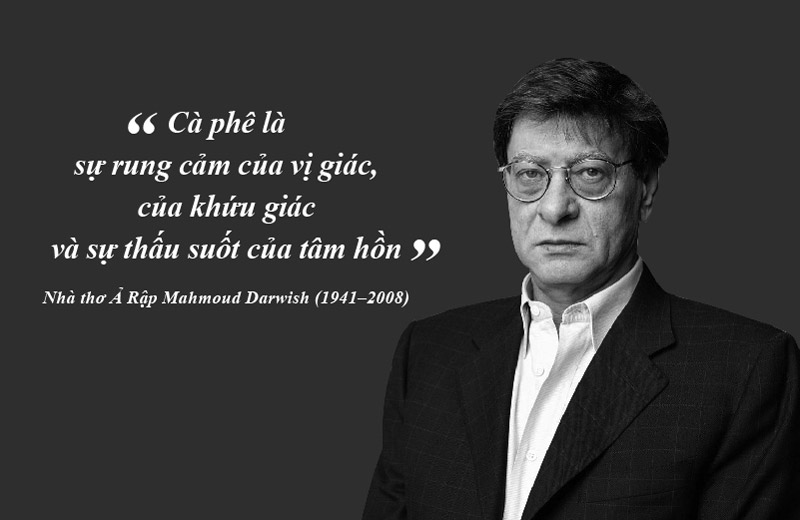
“Coffee is the vibe of taste, smell and insight of the soul” Arab poet Mahmoud Darwish (1941 – 2008)
The Arabic Coffee Ritual is recognized by UNESCO as an Intangible Heritage of Humanity. For centuries, coffee has been an important element of Arab culture, representing hospitality, generosity, and peace.
Coffee etiquette – the sacred hospitality duty
The ancient Arabs were largely nomadic. They moved all over the desert wilderness. Frequently facing danger, Arabs were forced to live in mutual support. When they reached another land, their safety depended on the hospitality of the locals.
Hospitality is linked to the existence of the Arab people, so welcoming guests is considered a sacred duty in the Arab community’s way of life and faith. With that, one of the most basic Arab principles is respect for honor. Honor is both a means of regulating social relations and the basis of social etiquette. Hospitality is the expression of respect for the honor of an individual, family or tribe.
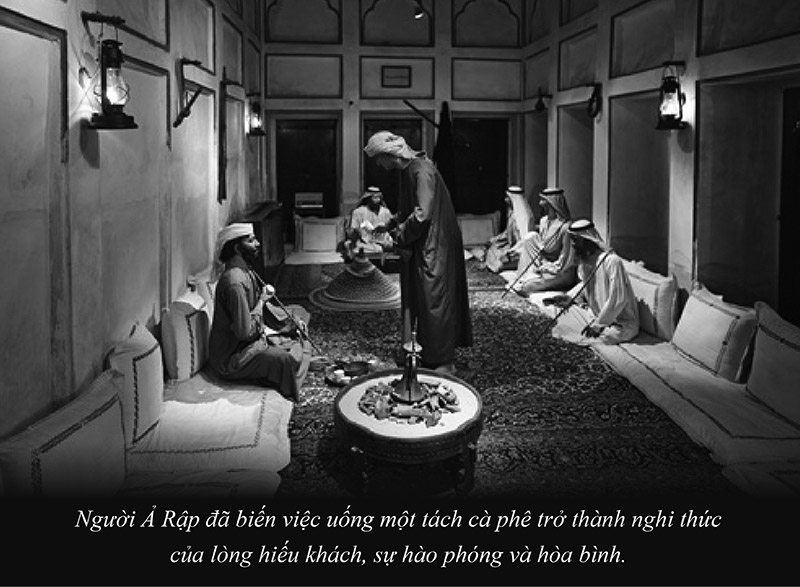
The Arabs have made drinking a cup of coffee a ritual of hospitality, generosity and peace.
According to Arab tradition, performing the coffee ceremony is the most important cultural norm in the reception ceremony. Coffee (Qahwah) is served in Majlis space – a special place to exchange knowledge and discuss family and community matters. The adult in the family selects the beans, roasts, grinds, and cooks the coffee in front of the guests. Herbs such as cardamom, nutmeg, cinnamon, cloves, saffron, ginger are cooked with coffee. These additives impart flavor and color variation to the cup, which is a distinctive feature of Arabic coffee culture from the rest of the world.
The set of coffee enjoyment tools includes a carved dallah pot. Small porcelain coffee cups called finjans. The host holds the dallah in his left hand, and the coffee cup in his right hand. The amount of coffee poured does not exceed a quarter of a cup, which is called “modest”. While inviting guests, the waiter prayed “May Allah rest upon him and his father and son, keep them safe”. Coffee is offered to everyone present at Majlis. Any omission is a sign of disrespect, which seriously affects the honor of guests and hosts.
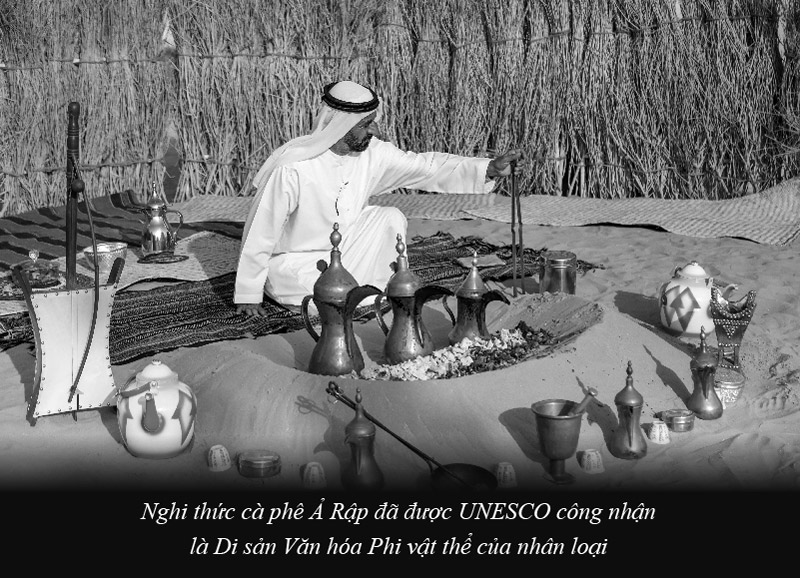
The Arabic Coffee Ritual has been recognized by UNESCO as an Intangible Cultural Heritage of Humanity
Usually, the guest is offered three cups of coffee. The first cup representing peace is called al-dhaif. The second cup establishes friendship, aka al-kaif. The third cup symbolizes loyalty and protection, called al-saif. After enjoying, the guest expressed his satisfaction and thanks by shaking the coffee cup. As such, there is an implicit understanding that they have built a good relationship.
Hospitality played an important role in the formation of Arab civilization. Contiguous between the three continents of Asia – Africa – Europe, the Arabian Peninsula has many international trade routes passing through, the most famous being the Silk Road and the Spice Road. In the beginning, the Arabs were just slaves and goods carriers. With special hospitality, they quickly connected and interacted with peoples from major civilizations both in the East and in the West. They learned from the experiences of others, using their intellect and creativity to come up with new ideas. They eventually reached a period of remarkable development, leading in many fields of scientific applications.
Coffee and the vision that changed Dubai
In the book “My Vision: Challenges in the Race for Excellence” – one of the 100 precious books in the “Life Changing Fundamental Bookcase” which was carefully selected by the Founder – Chairman of Trung Nguyen Legend Group Dang Le Nguyen Vu, encouraging the learning, absorbing and applying the quintessence of human knowledge, helping each individual shorten the path to success and true happiness – Ruler of Dubai, Sheikh Mohammed bin Rashid Al Maktoum said: the shortest path to the bright future that Dubai is looking for lies in its innovative and pioneering approach. In efforts to realize the Dubai’s vision, the Arab heritage, including the coffee culture that has existed for thousands of years, has been a direct factor that deeply affects all areas of creativity, helps focus, integrate and promote all values of resources contributing to the sustainable development of the Emirate of Dubai.
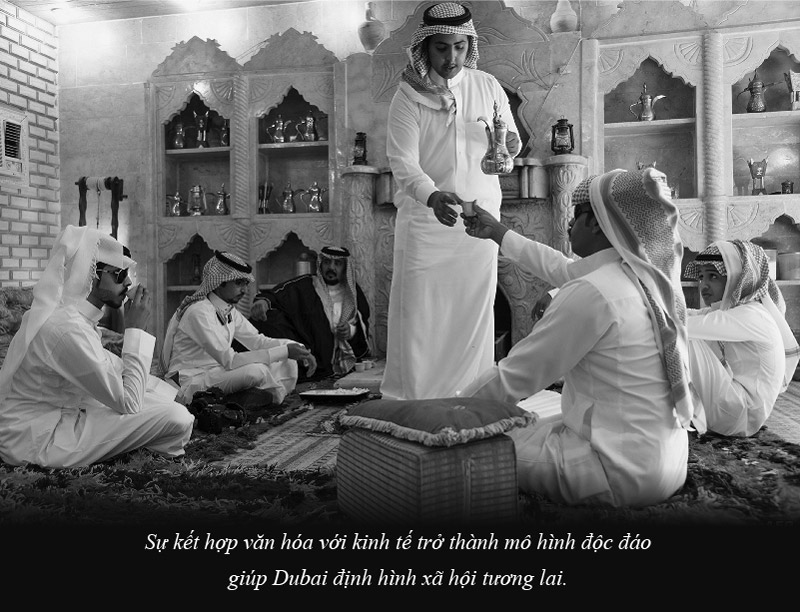
The combination of culture and economy becomes a unique model to help Dubai shape the future society
Today, the United Arab Emirates (UAE) is the place to preserve and practice the Arabic coffee rite as part of its cultural identity. In particular, Dubai is the center of coffee culture of the UAE and the Middle East.
Geographically small, but with a huge Arab cultural heritage. The Dubai government has launched an economic development model based on cultural values, elevating Dubai to the status of a “Global City”. One of Dubai’s central strategies is to create an “innovation incubator” ecosystem through the development of workshops and seminars that train, inspire, promote communication and creativity. It also celebrates the city’s cultural identity, providing exceptional experiences that bridge different cultures, thereby contributing to attracting international talent to work and create in Dubai…
Coffee shops have always played an important role in the strategy of promoting creative culture. On average, nearly 100 new cafes open in Dubai every month. Working at a coffee shop is chosen as an effective human resource connection solution and creative sublimation. A network of cafes is designed as a co-working space. Not only startups, freelancers, but many large corporations also encourage employees to spend time working in cafes to meet experts in all fields and in many different countries. The spaces A4Space Café, The Cribb, The Bureau, Make Art Café, Nook Café… are being seen as places to promote the creative and innovative community.
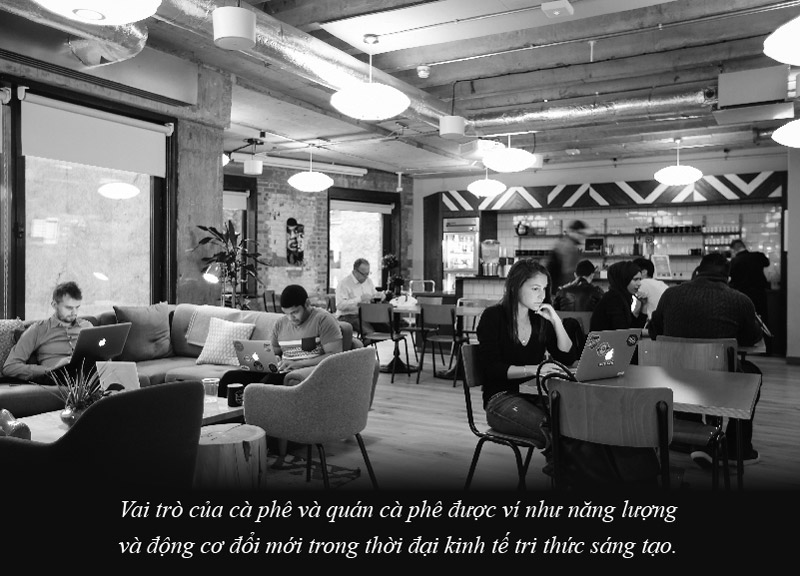
The role of coffee and coffee shop is likened to energy and innovation engine in the era of creative knowledge economy.
The type of “Knowledge Café” is a unique space to access knowledge. Famous coffee shops: Downtown Café, Book Mansion Café, BookMunch Café, Kuttab Café, Circle Cafe Dubai … were built as a multinational book library, gathering classics of the world from literature to science for all ages. These cafes provide knowledge base and engage the creative world with a variety of interactive workshops.
Dubai also develops a type of coffee space in the technology age as a “virtual knowledge café” to connect experts, entrepreneurs, research institutions, and talents around the globe through a virtual online environment. The “virtual knowledge cafe” also includes group discussions, training courses and webinars to optimize sharing of data, information, and experiences. The “virtual knowledge cafe” expands the reach of connections, crosses all geographical distances, creates opportunities for people to join conversations on topics of interest to them, gives them the opportunity to develop their ideas.
Dubai achieved a miraculous growth rate, becoming the world’s economic center with huge financial, information technology, tourism, and real estate centers. Dubai attracts many creative, highly qualified people from all over the world to work. These talented people are leading and coordinating the Dubai economy that thrives on knowledge and differentiated ideas.
Although there is a shift from traditional Majlis to modern cafe spaces, Dubai leaders always emphasize that culture is the soul of economic development. Majlis remains a special place of connection between community groups. Children are educated on coffee etiquette. The government established the Middle East’s largest Coffee Hub to connect the world’s most influential coffee markets. Dubai Coffee Museum built in the old town of Al Fahidi. Cultural festivals, coffee festivals … are held annually to remind and honor the Arabic coffee heritage.
THE REAL COFFEE
ROASTED ONLY FOR PEOPLE OF WISDOM!
Source: “The Philosophical Way of Coffee” – copyright by Trung Nguyen Legend


